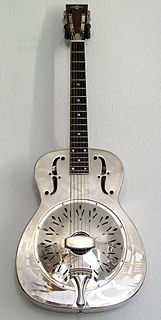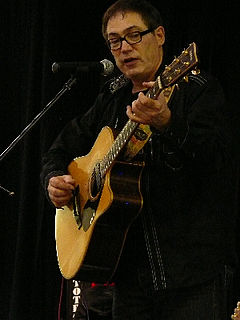
The steel-string acoustic guitar is a modern form of guitar that descends from the gut-strung Romantic guitar, but is strung with steel strings for a brighter, louder sound. Like the modern classical guitar, it is often referred to simply as an acoustic guitar.

The bass guitar, electric bass or simply bass, is the lowest-pitched member of the guitar family. It is a plucked string instrument similar in appearance and construction to an electric or an acoustic guitar, but with a longer neck and scale length, and typically four to six strings or courses. Since the mid-1950s, the bass guitar has largely replaced the double bass in popular music.

An electric guitar is a guitar that requires external amplification in order to be heard at typical performance volumes, unlike a standard acoustic guitar. It uses one or more pickups to convert the vibration of its strings into electrical signals, which ultimately are reproduced as sound by loudspeakers. The sound is sometimes shaped or electronically altered to achieve different timbres or tonal qualities on the amplifier settings or the knobs on the guitar from that of an acoustic guitar. Often, this is done through the use of effects such as reverb, distortion and "overdrive"; the latter is considered to be a key element of electric blues guitar music and rock guitar playing.

The guitar is a fretted musical instrument that typically has six strings. It is held flat against the player's body and played by strumming or plucking the strings with the dominant hand, while simultaneously pressing selected strings against frets with the fingers of the opposite hand. A plectrum or individual finger picks may be used to strike the strings. The sound of the guitar is projected either acoustically, by means of a resonant chamber on the instrument, or amplified by an electronic pickup and an amplifier.
Ibanez is a Japanese guitar brand owned by Hoshino Gakki. Based in Nagoya, Aichi, Japan, Hoshino Gakki were one of the first Japanese musical instrument companies to gain a significant foothold in import guitar sales in the United States and Europe, as well as the first brand of guitars to mass-produce the seven-string guitar and eight-string guitar. Ibanez manufactures effects, accessories, amps, and instruments in Japan, China, Indonesia and in the United States. As of 2017 they marketed nearly 165 models of bass guitar, 130 acoustic guitars, and more than 300 electric guitars. After Gibson and Fender, Ibanez is considered the third biggest guitar brand.

An archtop guitar is a hollow steel-stringed acoustic or semiacoustic guitar with a full body and a distinctive arched top, whose sound is particularly popular with jazz, blues, and rockabilly players.

The baritone guitar is a guitar with a longer scale length, typically a larger body, and heavier internal bracing, so it can be tuned to a lower pitch. Gretsch, Fender, Gibson, Ibanez, ESP Guitars, PRS Guitars, Music Man, Danelectro, Schecter, Jerry Jones Guitars, Burns London and many other companies have produced electric baritone guitars since the 1960s, although always in small numbers due to low popularity. Tacoma, Santa Cruz, Taylor, Martin, Alvarez Guitars and others have made acoustic baritone guitars.
The Ovation Guitar Company is a manufacturer of string instruments. Ovation primarily manufactures steel-string acoustic guitars and nylon-string guitars, often with pickups for electric amplification. In 2015, it became a subsidiary of Drum Workshop after being acquired from KMCMusicorp.

Godin Guitars is a Canadian manufacturing company headquartered in Montreal that specializes in string instruments. The company is owned by founder Robert Godin,.

A resonator guitar or resophonic guitar is an acoustic guitar that produces sound by conducting string vibrations through the bridge to one or more spun metal cones (resonators), instead of to the guitar's sounding board (top). Resonator guitars were originally designed to be louder than regular acoustic guitars, which were overwhelmed by horns and percussion instruments in dance orchestras. They became prized for their distinctive tone, however, and found life with bluegrass music and the blues well after electric amplification solved the problem of inadequate volume.

An acoustic guitar is a musical instrument in the string family. When a string is plucked its vibration is transmitted from the bridge, resonating throughout the top of the guitar. It is also transmitted to the side and back of the instrument, resonating through the air in the body, and producing sound from the sound hole. The original, general term for this stringed instrument is guitar, and the retronym 'acoustic guitar' distinguishes it from an electric guitar, which relies on electronic amplification. Typically, a guitar's body is a sound box, of which the top side serves as a sound board that enhances the vibration sounds of the strings. In standard tuning the guitar's six strings are tuned (low to high) E2 A2 D3 G3 B3 E4.

Giuseppe "Peppino" D'Agostino began playing guitar at the age of 10 when he heard his cousin play in church. He is basically self-taught and began picking out tunes by ear. Inspired by musicians like Paco de Lucia, Leo Kottke and Carlos Santana, he was composing and performing throughout Italy by the age of 18. After making his debut recording in his homeland with his first album Bluerba in 1981 and Silk and Steel two years later – both with fellow players that appreciated American bluegrass and new acoustic styles – D'Agostino took the bold leap and moved to America in 1985. Starting out by performing in the streets and on Fisherman's Wharf in San Francisco, he graduated to playing in restaurants then clubs, and finally, concert halls and festivals after a fellow musician introduced D’Agostino to a booking agent. He made his American recording debut in 1987 with Acoustic Spirit on Shanachie Records.
Tacoma Guitars was an American manufacturing company of musical instruments. It was founded in 1991 as a division of South Korean company Young Chang. Instruments were manufactured in Tacoma, Washington. The company and brand name were later acquired by the Fender Musical Instruments Corporation. The Tacoma plant closed, and production ceased, in 2008.
Electric guitar design is a type of industrial design where the looks and efficiency of the shape as well as the acoustical aspects of the guitar are important factors. In the past many guitars have been designed with various odd shapes as well as very practical and convenient solutions to improve the usability of the object.

The Material is an American rock band from San Diego, California. Colleen D'Agostino (vocals) moved to San Diego to pursue a music degree at San Diego State University. In her third year, she began playing with Jon Moreaux (guitar) and Noah Vowles (drums). The three added bassist Kevin Falk, formerly of Every Time I Die and Between the Buried and Me, and started writing songs for their first demo. Kevin was replaced by Brian Miller (bass), and Roi Elam (guitar) joined shortly after. With the permanent line up, The Material went into the studio to record their 6-song debut EP Tomorrow, which was co-produced by Brian Grider and was released on September 1, 2007. They placed in the top three of the Dew Circuit Breakout of 2007, losing to Seattle band The Myriad.

A bridge is a device that supports the strings on a stringed musical instrument and transmits the vibration of those strings to another structural component of the instrument—typically a soundboard, such as the top of a guitar or violin—which transfers the sound to the surrounding air. Depending on the instrument, the bridge may be made of carved wood, metal or other materials. The bridge supports the strings and holds them over the body of the instrument under tension.

Taylor Guitars is an American guitar manufacturer based in El Cajon, California, and is one of the largest manufacturers of acoustic guitars in the United States. They specialize in acoustic guitars and semi-hollow electric guitars. The company was founded in 1974 by Bob Taylor and Kurt Listug.
The Fender Telecaster, colloquially known as the Tele, is the world's first mass-produced, commercially successful solid-body electric guitar. Its simple yet effective design and revolutionary sound broke ground and set trends in electric guitar manufacturing and popular music. Introduced for national distribution as the Broadcaster in the autumn of 1950 as a two-pickup version of its sister model, the single-pickup Esquire, the pair were the first guitars of their kind manufactured on a substantial scale. A trademark conflict with a rival manufacturer's led to the guitar being renamed in 1951. Initially, the Broadcaster name was simply cut off of the labels placed on the guitars and later in 1951, the final name of Telecaster was applied to the guitar to take advantage of the advent of television. The Telecaster quickly became a popular model, and has remained in continuous production since its first incarnation.

Jon Bryant is a Canadian singer-songwriter. Native born to Halifax but now based in Vancouver, British Columbia, Bryant writes and sings acoustically melodic songs with a maritime influence.

Donald L. Alder, or Don Alder, is a Canadian fingerstyle guitarist/singer/songwriter/composer/speaker.
















